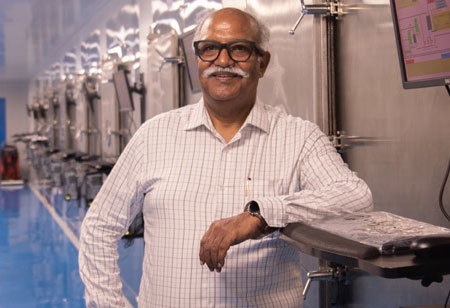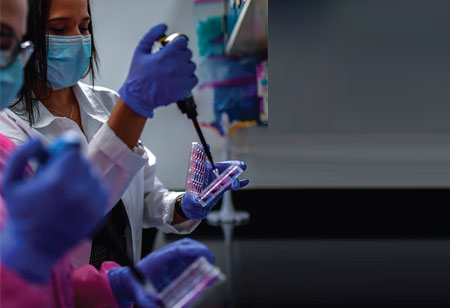
Importance Of Early Diagnostics For Reducing The Spread Of Infectious Diseases


Sriram Natarajan, Founder, Director & CEO, Molbio Diagnostics, 0
Globally, each year, millions of people are affected by infectious diseases such as Dengue, Chikungunya, Malaria, COVID-19, H1N1, TB, Hepatitis, HIV, and others,which are caused by pathogenic microorganisms such as bacteria, viruses, fungi, or parasites. Most infectious diseases can be successfully cured if diagnosed early & accurately and treated appropriately how ever, delayed and inaccurate diagnosis denies access to appropriate and timely medical aid, resulting in the decline in patient's health and thus increasing the risk of complications and even mortality.
Undiagnosed patients are the threats for society, as they transmit the disease to others unknowingly. It is critically imperative to diagnose infectious diseases on time and accurately. This will help not only in improving the effectiveness of the treatment and avoiding longterm complications for the infected patient, but also prevent the spread of the disease as well. Timely diagnosis also helps to avoid presumptive treatmentleading to indiscriminate use of antibiotics, and that has been contributing to an unprecedented rise in antibiotic resistance. Early and accurate diagnosis enables the initiation of evidence-based treatment for the patient.
Molecular diagnostics is one of the prominent & fastest growing methods in anatomic and clinical pathology that has the capability to reduce the time to results and provide more accurate diagnosis. It is the state-of-the-art in infectious disease testing. Molecular diagnostics works on DNA/RNA amplification concept, hence provides the ability to diagnose disease early in infection because of its excellent sensitivity and specificity.
For a long time, molecular diagnostics was an under served segment in the Indian diagnostics scenario, especially the Real Time PCR technique that was invented several decades ago and is considered the gold standard for diagnosing many diseases. Mole cular diagnostics requires a high level of infra structure and skill dependence, which was the primary reason for not using this technique. There were other issues as well, such as batch testing, logistics issues of sample transportation, and the consequent long turnaround time for results. There fore,the usage was very limited to confirmatory testing, which was available at a few major
Indian city hospitals and centralized laboratories.
The outbreak of Covid-19 has dramatically increased the need for RT PCR tests. This has significantly increased the number of labs doing molecular testing in the country. Due to the growing awareness of molecular testing in India, there is high demand for the early diagnosis of infectious disease. Due to this increased awareness many public and private organizations are investing funds to accelerate R&D in the field of molecular diagnostics.
The increasing prevalence of infectious diseases like tuberculosis, hepatitis B, and hepatitis C, coupled with tests for sexually transmitted diseases or infections like HIV and HPV are driving the segment's growth. In the near future, molecular testing is expected to become more of a routine clinical diagnostics tool not only for Covid, but for a wide range of infectious diseases. For instance, point of care molecular tools such as True nat will help in providing equal access to high quality diagnostics across all segments of society to minimize the devastating impact of delayed diagnosis.

Going forward, enhancing primary healthcare infra structure for decentralized molecular testing is an urgent need to prepare communities for managing existing diseases and combating future disease out breaks. It is only point of care molecular testing that will pave the way, enabling reliable results with rapid turnaround time.The ability to accurately and rapidly diagnose, counsel, and treat patients on the same day of presentation would decrease the number of patients lost to follow-up.
Early disease diagnosis and case detection will be a success only when we are able to synergize primary care and public health. Without a primary care physician having access to quick and accurate diagnosis, notifying public health and precise & prompt treatment might not be initiated. If the cause is not detected accurately, then these infections can spread or reoccur. The innovative medicines and diagnostics tests are only meaningful and impactful if they reach the people who need them irrespective of where they live.
The outbreak of Covid-19 has dramatically increased the need for RT PCR tests. This has significantly increased the number of labs doing molecular testing in the country. Due to the growing awareness of molecular testing in India, there is high demand for the early diagnosis of infectious disease. Due to this increased awareness many public and private organizations are investing funds to accelerate R&D in the field of molecular diagnostics.
Due to the growing awareness of molecular testing in india, there is high demand for the early diagnosis of infectious disease
The increasing prevalence of infectious diseases like tuberculosis, hepatitis B, and hepatitis C, coupled with tests for sexually transmitted diseases or infections like HIV and HPV are driving the segment's growth. In the near future, molecular testing is expected to become more of a routine clinical diagnostics tool not only for Covid, but for a wide range of infectious diseases. For instance, point of care molecular tools such as True nat will help in providing equal access to high quality diagnostics across all segments of society to minimize the devastating impact of delayed diagnosis.

Going forward, enhancing primary healthcare infra structure for decentralized molecular testing is an urgent need to prepare communities for managing existing diseases and combating future disease out breaks. It is only point of care molecular testing that will pave the way, enabling reliable results with rapid turnaround time.The ability to accurately and rapidly diagnose, counsel, and treat patients on the same day of presentation would decrease the number of patients lost to follow-up.
Early disease diagnosis and case detection will be a success only when we are able to synergize primary care and public health. Without a primary care physician having access to quick and accurate diagnosis, notifying public health and precise & prompt treatment might not be initiated. If the cause is not detected accurately, then these infections can spread or reoccur. The innovative medicines and diagnostics tests are only meaningful and impactful if they reach the people who need them irrespective of where they live.